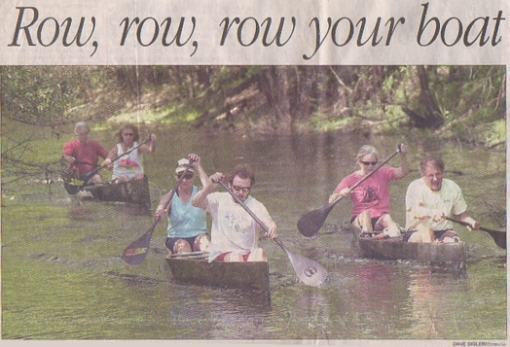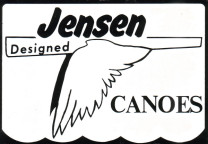Athletes descend on Citrus County to train in kayaks, canoes with marathon racer
Much like baseball's spring training, dozens of canoers and kayakers flock each year to Inverness to train for the impending start of
the marathon canoeing season.
Marathon canoe racing can refer to a race as short as 45 minutes or as long as 17 hours.
There is no schedule to follow, as all of the canoers are from various areas of the United States and Canada and have their own races in their own areas.
Most end up camping out or staying at Gene Jensen's house, while training on, but not limited to the Withlachoochee River, Rainbow Springs and Lake Tsala Apopka and Lake
Rousseau.
"We train on any kind of water," Jensen said.
Jensen has lived in Inverness for 25 years and moved here for the weather and the many bodies of water in the area.
"I had build this house here because it was an ideal location to train.," Jensen said. "It's much warmer down here now at a time when the water up north is much more cold."
Jensen does want to dispel the noting that he is staging a training camp of any sort.
"If you wanted to call it a training camp, which it isn't," Jensen said. "It would be the most informal camp you've ever seen in your life."
Why are people attracted to this area then?
Besides the obvious attraction of the climate ant the geography, Jensen himself is a draw.
"People come here to see Gene," said Dan Hassel, who hails from Hobings, Mont. "Gene has a background of racing. If you go back to the 1940's when marathon canoeing started, Gene
was there."
Jensen also cites two less obvious reasons.
"No one wants to paddle alone," Jensen said. "And also because everyone is competitive."
What kind of people are drawn to the sport?
"It has always amazed me from day one how attracted the intellectual crowd is to the sport," Jensen said. "A lot of these people are from up north as far as Canada."
The attorney general of New Hampshire has been down in recent years. A judge from Maine. People from Minnesota, Canada, and Massachusetts. A log cabin builder from Montana.
People are attracted to the sport for various reasons.
"It is fun," Jensen said. "It is one of the most complicated sports in the world and people also love the challenge of it. You have to run with the canoes, paddle the canoe and
also be able to navigate. By looking at certain characteristics like the shoreline, you can often tell what is coming up ahead."
Hassel agreed.
"A lot of it form me is for health," Hassel said. "It has also enabled me and other racers to travel all over the world. All over North America, Europe, and even to
China."
By Jon-Michael Soracchi
Citrus County Chronicle
Sunday March 14, 2004



